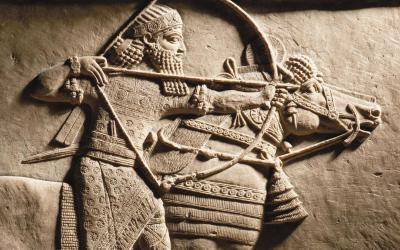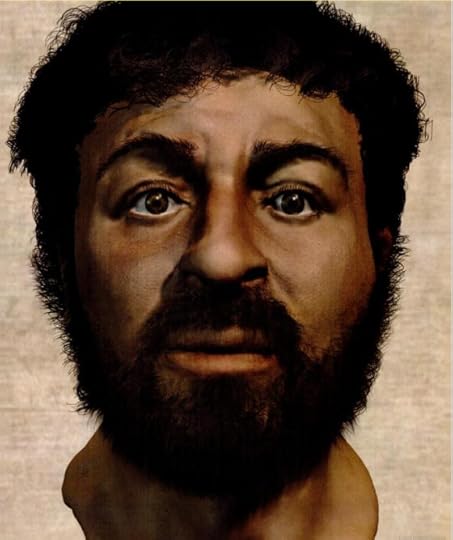Andrew Butterworth's Blog
June 13, 2020
Jonah ends on a cliff-hanger: so what happens next?
The book of Jonah stops suddenly. God asks Jonah a question and we don’t hear Jonah’s answer. Does Jonah change his heart or does he stay bitter towards Nineveh and angry towards God? And what happened to the Assyrians? Did they stay repentant towards God? Did start worshipping Yahweh? Or did they slip back into their old ways?
Here’s what happened to the major players after the book finishes.
1. Jonah
The first clue to this is that somebody later wrote the story. The only way they could get most of the detail would be if Jonah was willing to share it – how else would we know Jonah’s prayer inside of the fish?
This probably means that Jonah did change his heart and was willing to share his embarrassing story. Only a humble, more mature Jonah would reveal a story so embarrassing. He was God’s prophet and it would be difficult to share his failings.
Another clue is all the way through the story Jonah comes up short and we are taught to learn from his mistakes. But when Jesus talks about him, Jonah is honoured as Jesus mentioned how the Assyrians repented at Jonah’s preaching. Jonah didn’t have a great middle to his life, but in the redemptive way of God, it’s likely that he ended well. If anybody had inside info into this, it would be God (in the form Jesus). I wish the same could be said of Jonah’s homeland, Israel, the ten tribes of the Northern Kingdom…
2. Israel
20 years later, the Assyrians are used by God to bring judgment on Israel. The 10 tribes of the northern kingdom are carried off into exile in 722 BC. Numerous prophets had warned Israel that judgment would come if they didn’t repent. The irony here is that Jonah brought the same prophecy to the Assyrians and while the Assyrians repented Israel did not. The ten tribes of the Northern Kingdom were never the same again. When they did return eventually, they inter-bred with the local Canaanites and at the time of Jesus were called the Samaritans. If you remember how these were seen in the time of Jesus, they weren’t considered the people of God anymore by the Jews. There is the parable of the Good Samaritan and the narrative of Jesus talking to the woman at the well. In contrast to the Northern Kingdom, Judah, the Southern Kingdom went into exile to Babylon 150 years later. But when they returned to the land they never went back to idolatry and became the “Jews” of Jesus’ time – zealous for the temple and worship of Yahweh.
2. The Assyrians
After such a good response to Jonah, things didn’t last for the Assyrians. They returned to their wicked ways. About 100 years later, the prophet Amos announced judgment on them again. And this time it happened. God used the Babylonian empire to execute this judgment and that was the last the world saw of the Assyrian empire.
What should we learn from this?
In the end, Jonah, Israel, Judah and Assyria all hardened their hearts towards God. All received judgment from God. While Jonah and the Southern Kingdom of Judah repented and continued in humility, the Northern Kingdom of Israel, and the Assyrians did not. Their repentance didn’t last and neither did they.
It reminds me of Jesus’ parable of the Sower (Mat 13:1-23). Some seed fell on rocky soil and only grew a short while, whereas other seed fell in good seed and grew into a full seed-bearing plant. This is the form of repentance God is looking for.
We learn that true repentance leads to lasting change. God loves us and he wants to see us free from sin and selfishness. The method he has given us is repentance. It’s through coming to God in our emotions, admitting our faults and asking God to change us that our hearts change. Long-lasting change of behaviour requires true heart change. It’s the only way.
This heart change is only possible because the ‘one greater than Jonah’. Jesus had his heart broken on the cross so that our rebellious and wounded hearts could be mended. While Jonah experienced the brunt of God’s anger in the storm himself, Jesus took on that anger on our behalf. He experienced that storm on the cross so that we don’t have to.
That’s the message of Jonah: the compassion God has for people – even the rebellious Assyrians – even people like you or I.
__________________________
If you want to dive deeper with the book of Jonah, I’ve written a 30-Day devotional. In one month, at ten mins a day, you’ll read through the entire book. As well as an explanation of each verse, there is a suggested application and a guided prayer. Get it now from Amazon and develop a deep love for this moving book.

Jonah ends on a cliff-hanger: so what happens next?
by Andrew Butterworth | Jun 13, 2020
The book of Jonah stops suddenly. God asks Jonah a question and we don’t hear Jonah’s answer. Does Jonah change his heart or does he stay bitter towards Nineveh and angry towards God? And what happened to the Assyrians? Did they stay repentant towards God? Did start...
read more

Why did God care about the Ninevites?
by Andrew Butterworth | May 31, 2020
God really wanted Jonah to go to Nineveh - he sent him twice! The first time Jonah fled but after a stormy time, he repented and said he was ready to serve God again. And what did God say? ‘Nothing’s changed – see previous instruction’. What we conclude from this is...
read more

Why did Jonah run from God?
by Andrew Butterworth | May 25, 2020
Right at the start of the book, God says, ‘Go to Nineveh’. Jonah says ‘No way!’. God’s prophet would rather flee to the other side of the world than carry out his commission. Why? You need to know a bit about the background. For instance, if you didn’t know who the...
read more
The post Jonah ends on a cliff-hanger: so what happens next? appeared first on Andrew Butterworth.
May 30, 2020
Why did God care about the Ninevites?
God really wanted Jonah to go to Nineveh – he sent him twice! The first time Jonah fled but after a stormy time, he repented and said he was ready to serve God again. And what did God say? ‘Nothing’s changed – see previous instruction’. What we conclude from this is that God message to Nineveh was really important to him. We see God explain why right at the end of the book
“ And should I not have concern for the great city of Nineveh, in which there are more than a hundred and twenty thousand people who cannot tell their right hand from their left—and also many animals? ” (Jonah 4:11)
Why does God show concern for rebellious cities like Nineveh?
In general, cities are strategic – if you reach the city you reach the region. If Nineveh repented then there would be a knock-on effect with the whole of the Assyrian nation.
Another reason is that cities are where the people. God loves people therefore he has concern for cities.
You see this strategy with Jesus. When he’s commissioning the disciples, he says go to the capital city, then to the region: Jerusalem and then Judea – there’s no instruction to go to Bethlehem or Capernaum. Jonah was sent to Nineveh because to reach the Assyrians you reached their capital.
It’s the same today, cities are strategic for us today. Culture flows from cities. All the influencers are in cities. If we want to complete Jesus’ Great Commission, we need to prioritise cities, because it’s the most efficient way to reach people. Most of the world lives there now.
That’s in general, but why did God send Jonah to THIS city?
Jonah chapter 4 tells Nineveh had a population of 120,000 people. Jonah said that it took three days to walk across it – huge for that time! The city was:
Rich: “There is no end to the treasure” Nahum 2:9
Violent: “Woe to the bloody city” Nahum 3:1 and in Jonah 3:8 the Kings tells the citizens to “give up their evil ways and their violence”
Wicked: “their wickedness has come up before me” Jonah 1:2
God’s Message to Nineveh
And the message God told Jonah to bring? Judgment! God’s anger had built up against their wickedness and violence. However, God wants to give them a chance to repent.
This is a small-scale pattern of what is happening in the world today: wickedness, violence, injustice, selfishness etc. rises to God in the same way that Nineveh’s did. God’s decision is that justice must occur. But before that happens, he sends out his messengers to give people a chance to repent.
Nineveh had Jonah. The world has followers of Jesus. That might be you or I.
God sent Jonah because he didn’t want the Assyrians to continue in their wickedness. It’s the same today. God doesn’t want anyone to perish (2 Peter 2:3) therefore he sends believers to warn of his anger against injustice. Injustice that is harming the people he loves.
Many of us have walked through this process. We were far off like the Assyrians, but we have turned from our sins and we have discovered a God that is ‘slow to anger but abounding in love.’ (Psalm 103:8 and many other places).
So, God sends Jonah, but he also sends us.
God’s Message Today
It’s different today, however. All Jonah had was a message of judgement. Because of Jesus, we have a message of judgment AND mercy. And when it comes to judgment, Jesus bore the full brunt of that judgment. Our message is one of judgment and mercy but with the sting of judgment taken away.
Jesus told the religious leaders of his day that the only sign he would give them was the sign of Jonah. He was referencing this situation (Matthew 12:38-42). The people of Nineveh repented at the preaching of Jonah. But Jesus declared that one greater than Jonah was now standing amongst them. What was he saying?
Jesus was saying that if wicked, godless people could turn from their ways and turn to God so could the religious leaders. The problem was, they thought they didn’t need to. Pride was blocking them from seeing the truth.
All the way through the book, God confronts Jonah’s pride. And in the middle section of the book, God wins through. Jonah changed but the religious leaders of Jesus’ day didn’t. What about you? Are you willing to journey with Jonah and see if there is anything that God wants to shift in you? I’ve written a 30-Day devotional to do just that. In one month, at ten mins a day, you’ll read through the entire book. As well as an explanation of each verse, there is a suggested application and a guided prayer. Get it now from Amazon and allow God to do a work inside of you.

Why did God care about the Ninevites?
by Andrew Butterworth | May 31, 2020
God really wanted Jonah to go to Nineveh - he sent him twice! The first time Jonah fled but after a stormy time, he repented and said he was ready to serve God again. And what did God say? ‘Nothing’s changed – see previous instruction’. What we conclude from this is...
read more

Why did Jonah run from God?
by Andrew Butterworth | May 25, 2020
Right at the start of the book, God says, ‘Go to Nineveh’. Jonah says ‘No way!’. God’s prophet would rather flee to the other side of the world than carry out his commission. Why? You need to know a bit about the background. For instance, if you didn’t know who the...
read more

What’s the Book of Jonah all about?
by Andrew Butterworth | May 22, 2020
Jonah was a prophet in the 8th Century BC - well known enough to have access to King Jeroboam II, the king of Israel (see 2 Kings 14:24). By Jonah's time, the glory days of David and Solomon were long over. The kingdom had been split in two and Jonah was ministering...
read more
The post Why did God care about the Ninevites? appeared first on Andrew Butterworth.
May 25, 2020
Why did Jonah run from God?
Right at the start of the book, God says, ‘Go to Nineveh’. Jonah says ‘No way!’. God’s prophet would rather flee to the other side of the world than carry out his commission. Why?
You need to know a bit about the background. For instance, if you didn’t know who the Nazis were you may not understand the horror if a Jew was asked to preach against Hitler in Berlin in the early 1940s.
Assyria was the dominant power of the region and Nineveh was their mighty capital. Assyria had been extracting tribute from Israel for a long time by now. Jonah would have watched the gradual expansion of their empire with horror and known that it was just a matter of time before Israel was next. And Jonah would have been correct. In a couple of decades or so, Assyria would capture Israel’s capital and exile all the people to a foreign land.
The Assyrian empire was not only Israel’s enemy, but they were a cruel, merciless people who delighted in torturing those they conquered:
Limbs were cut off so they could watch people bleed to death.
People were burnt alive and relatives were forced to parade their loved ones’ heads on poles through the city streets.
When Jonah eventually does preach to them the king responds by telling the citizens of Nineveh to “turn… from the violence”. Over the course of the centuries there have been public announcements given to city dwellers. Telling the whole population of a city to ‘stop being violent’ probably doesn’t rank too highly.
Fleeing from God
Jonah ran because he was determined to stop any chance those evil Assyrians might repent. If he wasn’t anywhere near him, then they couldn’t hear God’s message and have a chance to repent and change. It was an illogical choice because God could have simply raised somebody else up to speak to them. But Jonah wasn’t thinking logically. In the emotion of it all, he legged it out of Israel leaving behind his family, friends and his culture.
In his rebellion, he would travel 100kms on foot to get to the coastal town of Joppa – the same place where the apostle Peter would have his roof-top vision in Acts 10.
Jonah would then pay a significant amount of money to board a ship to take him to as far west as Israelites knew to go. It’s not known exactly where Tarshish is (some think Spain) but think: ‘as far across the Mediterranean Sea as possible’.

Ironically, he was fleeing one Gentile city to go to another Gentile city. But he’d have no way of getting back from Tarshish – even if he reached there safely. Ship journeys back then were hit and miss. The longer you sailed for, the higher the chance of not making it.
Jonah wasn’t just abandoning his family and friends; he was abandoning his God. The ESV says he fled ‘from the presence of the Lord’ (Jonah 1:2)
It’s not a good start to the book. In the first three sentences, you have the Ninevites in active rebellion of God and Jonah, God’s prophet in active rebellion. You’d think it could only go up from here. But it doesn’t. Jonah runs from God a fair bit more before he eventually re-engages him again and acknowledges that God is God and he is not.
So, why did Jonah run from God?
Some deep-seated emotion was driving him to go to this extreme. Was it fear? To enter the Assyrian capital alone surely would have put his life at risk. But Jonah doesn’t seem too afraid when he eventually goes to preach.
The final chapter of the story hints at the cause of this deep guttural reaction. We read that Jonah hates that God doesn’t bring doing judgment on them. He wants fire from heaven – like Sodom and Gomorrah. But God shows them mercy. Jonah is deeply angered by this and tells God that his life is no longer worth living. You can feel the pain in his cry when God doesn’t do what he wanted.
The best guess we can derive from this is that Jonah is driven by hate. He hates the Assyrians and wants them destroyed. And to hold onto this hatred he willing to give up everything that ever meant anything to him. His home, his family, his friends, even his God.
__________________________
If you want to dive deeper with the book of Jonah, I’ve written a 30-Day devotional. In one month, at ten mins a day, you’ll read through the entire book. As well as an explanation of each verse, there is a suggested application and a guided prayer. Get it now from Amazon and develop a deep love for this moving book.

Why did Jonah run from God?
by Andrew Butterworth | May 25, 2020
Right at the start of the book, God says, ‘Go to Nineveh’. Jonah says ‘No way!’. God’s prophet would rather flee to the other side of the world than carry out his commission. Why? You need to know a bit about the background. For instance, if you didn’t know who the...
read more

What’s the Book of Jonah all about?
by Andrew Butterworth | May 22, 2020
Jonah was a prophet in the 8th Century BC - well known enough to have access to King Jeroboam II, the king of Israel (see 2 Kings 14:24). By Jonah's time, the glory days of David and Solomon were long over. The kingdom had been split in two and Jonah was ministering...
read more

Christianity – the world’s most misunderstood religion
by Andrew Butterworth | May 16, 2020
Religious Education classes were a strange affair. We studied all the major world religions. When it came to Christianity I was left wondering if the people teaching the class actually knew what Christianity was about. Growing up in the UK, I was the only person in my...
read more
The post Why did Jonah run from God? appeared first on Andrew Butterworth.
May 22, 2020
What’s the Book of Jonah all about?
Jonah was a prophet in the 8th Century BC – well known enough to have access to King Jeroboam II, the king of Israel (see 2 Kings 14:24).
By Jonah’s time, the glory days of David and Solomon were long over. The kingdom had been split in two and Jonah was ministering among the larger, more apostate Northern Kingdom.
Jonah gets a shock and is told to preach to Israel’s bitter enemies: the cruel Assyrians. As the great power of the day, they were already oppressing Israel and extracting regular tribute. And they had a reputation of incredible cruelty to those they conquered.
Something Fishy
If you have ever been to Sunday School, you’ll know that Jonah runs. He gets caught in a supernatural storm, offering to sacrifice himself to stop the pagan sailors getting caught in his dispute with God. And then God sends the most unusual rescue vehicle – a great fish (no whale is ever mentioned!).
Despite all his faults and failures, Jonah ends up preaching to an imposing enemy capital, declaring God’s words to them – and he sees them respond. He’s honoured for this with a whole book of the Bible. A book that gives us a great insight into the inner turmoil and difficulty of following God. Jonah’s legacy is such that Jesus sees fit to reference him and then declare that “one greater than Jonah” is among them. What did Jesus mean?
Jesus is referring more to the stubbornness of the people in front of him than the character of Jonah. Jesus is effectively saying that Nineveh repented in response to Jonah’s preaching but the people in front of him are not.
And this is the crux of the Jonah story.
If we learn anything from Jonah, it’s that God is a compassionate God who cares deeply for people and that he expects his followers to do the same. Jonah was hard-hearted and rebellious and God pursued him until he had won his heart round. The people of Nineveh were rebellious and wicked and God sent Jonah to pursue them. When their hearts changed towards him, then God quickly released his mercy over them. In a turn of irony, its Jonah that ends the book off with a hard heart towards God, not the Ninevites. And what is God doing at the end of narrative? He’s doing what he does throughout the book – pursuing people with hard hearts to try and win them round.
Perhaps if Jonah had ‘guarded’ his heart and protected it from bitterness and other toxic poison, the Book of Jonah would have been written very differently. But then maybe it wouldn’t have been in the Bible.
We are grateful today that God show us his deep love for mankind through the book. And why shouldn’t he? It’s his very nature.
“The LORD is gracious and compassionate, slow to anger and rich in love.” – Psalm 145:8
If you want to dive deeper with the book of Jonah, I’ve written a 30-Day devotional. In one month, at ten mins a day, you’ll read through the entire book. As well as an explanation of each verse, there is a suggested application and a guided prayer. Get it now from Amazon and develop a deep love for this moving book.

What’s the Book of Jonah all about?
by Andrew Butterworth | May 22, 2020
Jonah was a prophet in the 8th Century BC - well known enough to have access to King Jeroboam II, the king of Israel (see 2 Kings 14:24). By Jonah's time, the glory days of David and Solomon were long over. The kingdom had been split in two and Jonah was ministering...
read more

Christianity – the world’s most misunderstood religion
by Andrew Butterworth | May 16, 2020
Religious Education classes were a strange affair. We studied all the major world religions. When it came to Christianity I was left wondering if the people teaching the class actually knew what Christianity was about. Growing up in the UK, I was the only person in my...
read more

The real Jesus was brown-eyed, muscular and short
by Andrew Butterworth | May 16, 2020
Images in Western art have no bearing on the historical Jesus. From the best information we have, Jesus of Nazareth grew up in a village of a hundred families. Ethnically Jewish, he wouldn't have had long flowing hair, deep blue eyes and fair skin. Hipster Jesus is...
read more
The post What’s the Book of Jonah all about? appeared first on Andrew Butterworth.
May 16, 2020
Christianity – the world’s most misunderstood religion
Religious Education classes were a strange affair. We studied all the major world religions. When it came to Christianity I was left wondering if the people teaching the class actually knew what Christianity was about. Growing up the UK, I was the only person in my class that attended church regularly.
In RE, we learnt about Christmas and Easter and the Church etc. But we weren’t once taught about the heart of Christianity – the very concept that made it spread so much. A concept deemed so subversive, that Communist governments in Russia and China chose to outright ban it. And then persecute its followers. Why would anybody try to abolish Christianity, let alone attack its followers?
Russia and China weren’t alone. At one point in England, the Parliament banned people from practicing any version that wasn’t linked to the national church. People preferred prison to worshipping in the state Church! Even now, there are a long list of countries where practicing Christianity may cost you your life.
Why?
We were never told about this in Religious Education classes. For instance, Moravians Christians attempted to sell themselves into slavery to share their faith. Isn’t that taking religion far too seriously?
As religions go, Christianity is pretty megalithic. It’s currently the largest religion in the world, and has been for some time. If the references on its wikipedia page are to be believed, it has 2.4 billion adherents. This is expected to rise to 3 billion by 2050. With there being only 7.4 billion people on this planet, it means that Christianity reportedly represents 1 out of every 3 people.
This is an unexpected outcome. Christianity started out as an offshoot of Judaism, originally named as ‘The Way’. Its founder was a Jewish Rabbi, who taught only Jewish people. Did he ever envision it spreading to every country in the world, and becoming so huge?
The simple answer is that his disciples report that he did.
Because of that, whether you agree with him or not, Jesus was probably the biggest visionary that ever lived. Steve Jobs famously stated that his life’s ambition was to, ‘make a dent in the Universe.’ Propelled by that vision, he went on to create the world’s most valuable company. Jesus, instead of wanting to make a dent, foresaw a brand new Universe. He started by founding the world’s biggest religion. His last instructions to his disciples was to take his message to the corners of the earth.
But what has made his message so successful? What has made it so palatable to almost every human culture? Why did Vikings give up their raping and pillaging and settle down in Christian family units? Why have a 100 million Chinese switched from centuries of Buddhism, Taoism and Confucianism? Why do Africans flock in their millions when evangelists such as Reinhard Bonnke, hold Christian campaigns?
Why does a Jewish offshoot religion have adherents in every country in the world?
Given all this, why do writers of school curriculums fail to articulate this in the form that makes it so subversive?
It frustrates me no end.
Why? Because the message has subverted me. I cannot go back. The message has captured me in a way that I can now understand that Moravian zeal — if not baulk at the cost to their freedom.
And having experienced its subverting power in me, I now know why it has spread so rapidly, and so pervasively.
At its heart is hope. Real, true, authentic hope.
It’s not a politician’s hope that seems to quickly fade, or even a human hope that eventually lets you down. Its subversive power is it that it proves genuine time and time again. The more oppressive the environment, the more it seems to be proven true and spread the more rapidly.
When American teenagers instructed at gunpoint to renounce Christianity, and they don’t something is going on. When North Koreans hold on to their Christian hope — despite seeing many others executed for their faith, something is going on.
Why is this hope so genuine to so many people?
This is the truly incredible thing: Christianity teaches that this hope gets divinely placed inside of you. That’s the whole ‘born again’ thing that gets so badly misconstrued. A spiritual regeneration occurs that there’s no going back from. It’s no mistake that the writers of the Matrix trilogy came from a Christian worldview. The whole red pill — blue pill concept was an analogy of Jesus’ offer of spiritual rebirth. Everything changes if you go through with it.
That’s why Christianity has exploded throughout the world. Christianity offers a chance to be cleansed from our pasts and start again — but this time in partnership with, and under submission to God. This is the message that wasn’t once articulated to me in hours of Religious Education classes. It’s the message that few outside of Christianity really comprehend.
You know if this message has taken root inside of you, because you feel a cleansing from guilt, and pain and shame, that you have never known before. It’s difficult to articulate it, because it is something that happens to you.
But I know one thing, it’s a message that really is effectual, and it’s one that is going to continue to turn the world upside down – one person at a time.
The post Christianity – the world’s most misunderstood religion appeared first on Andrew Butterworth.
The real Jesus was brown-eyed, muscular and short
Images in Western art have no bearing on the historical Jesus. From the best information we have, Jesus of Nazareth grew up in a village of a hundred families. Ethnically Jewish, he wouldn’t have had long flowing hair, deep blue eyes and fair skin. Hipster Jesus is simply a fallacy.

(John Jay Cubuay/for The Washington Post)
Middle-eastern Jews in the first century were only, on average, 5ft 1in in height. In fact, most people 2000 years a go were a lot shorter than we are now. Height is based on genetics, but it is also about nutrition. Generation-on-generation we are getting taller because of better nutrition. As a Jewish peasant-artisan, Jesus wouldn’t have consumed the quantity of protein that is common in Western diets. Meat would have been a luxury, not a staple. So, to a modern observer, he would have appeared short.
And the brown eyes?

Well, definitely either brown or green. Genetically, blue eyes is a European thing and newsflash: Jesus wasn’t European (or North American!).
What about him being muscular? Well, he spent the majority of his adult life doing manual labour as a tekton, the Greek word for a skilled construction worker, carpenter or builder. Rather than having manicured delicate hands, his skin would have been weathered from outdoor work and callused.
Long hair was a no, no. Look at this passage in the Bible indicating a common cultural view at the time (1 Corinthians 11:14):
Does not the very nature of things teach you that if a man has long hair, it is a disgrace to him
Male fashions were far more conservative, particularly among the working class.
Talking of working class, his appearance was so typically working class that towards the end of the his life Roman soldiers couldn’t tell him apart from a gathering of mainly commercial fisherman (See Matthew 26:47-9).
So what did he actually look like?
You’ve probably seen this reconstruction that medical artist Richard Neave did. He used skulls from Jewish males from the 1st Century. This is far more likely to be the face of Jesus than any of the one that show up in Western art:

Popular Mechanics: The real face of Jesus
For the sake of accuracy, it’s probably time for you to dump those original Da Vincis and Raphaels.
The post The real Jesus was brown-eyed, muscular and short appeared first on Andrew Butterworth.
May 12, 2020
The gift of healing in every century of church history
Some people say that God only intervened miraculously in certain parts of history. Often quoted are the times of Moses, Elijah and Jesus/the early church. But this isn’t accurate. Not only is the Bible full of miracles and supernatural healings, but so is church history.
Conservative scholar, D.A. Carson said this:
“ there is enough evidence that some form of charismatic gifts continued sporadically across the centuries of church history that it is futile to insist on doctrinaire grounds that every report is spurious or the fruit of demonic activity or psychological aberration.”
When I wrote my book on healing, I decided to prove this. I looked for recordings of supernatural healings. Guess what? I found records for every century from the 1st Century to the present day. Some have warned me to be careful of hagiography, where the records of a Christian figure are exaggerated by the writer at the time to increase their importance. That may be true for some of the accounts, but it is unlikely this has occurred with some of the conservative theologians such as Luther, Wesley, and Edwards. And because church history tends to be written by those who are part of the institutional church, there are many testimonies missing from the radicals. E.g. the Anabaptists and the Lollards to name a couple.
Below is a sample of Christians’ accounts of miraculous healing experiences. This is taken directly from the appendix in my book: I’m Sick, Now What?
FIRST CENTURY
The New Testament writings specifically name Peter, John, Paul, Barnabas, and Ananias as healing the sick. More generally, the twelve and the seventy-two reported healings on their return to Jesus. In James’ pastoral letter, believers are encouraged to pray for the sick who are in the church.
SECOND CENTURY
JUSTIN MARTYR (A.D. 100–165)
Justin was a prominent apologist for the Christian faith, arguing for the Roman Emperor Antonius to bring a halt to the persecution of Christians. He founded his own philosophical school to promote Christianity in Rome. However, he fell into a dispute with another philosopher and was beheaded by the Roman authorities. Subsequently, the concept of martyrdom was named after Justin. In his book Second Apology (a.d. 153), Justin Martyr wrote about the continuation of the gift of healing:
For numberless demoniacs throughout the whole world, and in your city, many of our Christian men exorcising them in the name of Jesus Christ, who was crucified under Pontius Pilate, have healed and do heal, rendering helpless and driving the possessing devils out of the men, though they could not be cured by all the other exorcists, and those who used incantations and drugs.
IRENAEUS (A.D. 130–202)
Irenaeus, bishop of Lyons in Gaul (modern-day France) was also a powerful apologist, fighting against the heresy of Gnosticism. He believed in the continuation of supernatural healing. In his book Against Heresies (a.d. 185) he details many instances of supernatural healings, and even a number of people being raised from the dead.
THIRD CENTURY
ORIGEN (A.D. 184–253)
Origen was a prominent theologian from Alexandria, Egypt. His father was martyred during an outbreak of persecution but his mother protected him from the same fate. In his book Against Celsus (a.d. 250), Origen wrote about the gifts of the Spirit being in operation in the church, and said that those with healing gifts were producing “many cures.”
NOVATIAN (A.D. 200–258)
Novatian was famous for separating from the Church of Rome and forming his own church. This was over the issue of readmitting people who had denied their faith during persecution. Other than this difference, his church had the same theology and practice as the Roman church and continued into the seventh century. In chapter 29 of his Treatise of Novatian Concerning the Trinity (a.d. 270), Novatian wrote of healings and wonderful works being done in the Lord’s church everywhere:
This is He who places prophets in the Church, instructs teachers, directs tongues, gives powers and healings, does wonderful works, offers discrimination of spirits, affords powers of government, suggests counsels, and orders and arranges whatever other gifts there are of charismata; and thus make the Lord’s Church everywhere, and in all, perfected and completed.
FOURTH CENTURY
AUGUSTINE (A.D. 354–430)
Augustine was bishop of Hippo (modern day Algeria, Africa). He is famous for his theological works, Confessions and City of God, which are still widely read today. He is often called the “Father of Western Christianity.” Although originally not a believer in the continuation of the supernatural gifts, Augustine was persuaded by the genuine healings he saw around him. In the last section of The City of God he wrote about the miraculous healings that he had witnessed personally, including a blind man receiving sight.
HILARION (A.D. 291–371)
Hilarion was born in Gaza (modern day Palestine). When he was fifteen his parents died, and he gave away his inheritance to the poor and lived an ascetic life in the desert. After twenty-two years of this hermitic lifestyle, he became famous and was sought out for wisdom and prayer. Jerome, in his Life of Saint Hilarion (a.d. 390), recounts a number of healings that occurred during Hilarion’s ministry. This included successfully praying for a barren woman to have a son and a woman blind of ten years receiving instantaneous sight.
FIFTH CENTURY
PATRICK OF IRELAND (A.D. 387–461)
Patrick was a Scottish missionary to Ireland who saw many of its warring tribesmen become Christians. In The Life and Acts of Saint Patrick, a biography written by Jocelin, a twelfth century Scottish monk, it reads:
Under this most sanctified rule of life did he shine in so many and so great miracles that he appeared second to no other saint. For the blind and the lame, the deaf and the dumb, the palsied, the lunatic, the leprous, the epileptic, all who laboured under any disease, did he in the name of the Holy Trinity restore unto the power of their limbs and unto entire health; and in these good deeds was he daily practised. Thirty and three dead men, some of whom had many years been buried, did this great reviver raise from the dead, as above we have more fully recorded. And of all those things which so wondrously he did in the world, sixty and six books are said to have been written, whereof the greater part perished by fire in the reigns of Gurmundus and of Turgesius. But four books of his virtues and his miracles yet remain, written partly in the Hibernian, partly in the Latin language; and which at different times four of his disciples composed.
SIXTH CENTURY
COLUMBA (A.D. 521–597)
Columba was an Irish missionary to Scotland. He founded a number of abbeys, including an abbey on the Isle of Iona, which was the dominant Christian centre in Scotland for centuries. Adomnán, a relative and also a monk, wrote the account of Columba’s life in Vita Columbae. In book two, Adomnán describes many healing miracles occurring through Columba, even people who had died being brought back to life.
AUGUSTINE OF CANTERBURY (D. A.D. 604)
Augustine was an Italian missionary who was sent to England to evangelise the then-pagan nation. At that time England was made up of a number of kingdoms and Augustine went first to King Aethelberht, who had recently married the Christian daughter of a French king. King Aethelberht, and many others, became Christians. This led to the founding of the English church, with Augustine as its first archbishop (of Canterbury). Robin Mackintosh, in his book on Augustine, states there was a “notable ministry of healing and miracles that took place through Augustine and his monks, and that these wonders, healing in diseased and broken bodies as well as souls, were an authentic witness to the gospel for their time.”
SEVENTH CENTURY
CUTHBERT (A.D. 634–687)
Cuthbert lived in Northern England but was of Celtic origin. He was the bishop of Lindisfarne, in the kingdom of Northumbria (modern day Northern England). In book four of his biography, Vita Sancti Cuthberti (“Life of St. Cuthbert”), a number of healings are recorded, including healing an infant from the plague and a boy from paralysis.
EIGHTH CENTURY
BEDE (A.D. 673–735)
Bede was an English monk, author and scholar, based in Northern England. He translated many Latin and Greek early church writings, enabling his fellow Anglo-Saxons to have access to them. In his Ecclesiastical History of England, Bede writes of healings frequently, including healing somebody of blindness and raising an earl’s (English lord) servant back to life.
NINTH CENTURY
ANSGAR (A.D. 801–865)
Ansgar was archbishop of Hamburg-Bremen, in Germany. He was also a missionary to Sweden and Denmark, where he founded many churches and monasteries. This led to him to being known as the “Apostle of the North.” Adam of Bremen, in his Deeds of the Archbishops of Hamburg-Bremen, states that at one time Ansgar visited a hospital in Bremen daily, and “healed very many by his speech and by his touch.”
TENTH CENTURY
LUKE OF HELLAS (D. A.D. 946)
Luke lived an ascetic life out of devotion to God. He founded a monastery and church in Steiri, in mainland Greece, which remains to this day. In The Life and Miracles of St. Luke of Steiris Luke is reported to have performed many miracles, including healing sicknesses.
ELEVENTH CENTURY
ANSELM OF CANTERBURY (1033–1109)
Anselm, originally from Arles (modern-day France), was a philosopher and head of the English church. He was famous for being the originator of the ontological argument for God. Eadmer, in his biography of Anselm, tells us that Anslem was also famed as a worker of wonders. At times he miraculously produced food for his companions, and he once instantly healed a boy with a pain in his groin.
TWELFTH CENTURY
BERNARD OF CLAIRVAUX (1090–1153)
Bernard was the abbot of Clairvaux Abbey, France, and a gifted leader, rapidly expanding the Cistercian Monastic Order into many countries. His monasteries emphasised the reading and reflection of Scripture, empowered by the Holy Spirit. Bernard was also known for moving in the gifts of the Spirit. Watkin Wynn Williams, in his biography of Bernard, tells of a time when Bernard laid hands on a boy who was lame and saw him healed instantly.
THIRTEENTH CENTURY
DOMINIC OF OSMA (1170–1221)
Dominic was a Spanish monk and founder of the Dominican Order, a movement of travelling preachers. He was well-educated but when a famine hit Spain, he sold his furniture, manuscripts, and clothes to raise money to feed the poor. Reverend Alban Butler in his book The Lives of the Saints recounted that Dominic performed a “great number of miracles,” including three accounts of people being brought back to life after they had died.
FRANCIS OF ASSISI (1181–1226)
Francis grew up in a wealthy family in Assisi, Italy. After conversion, he renounced his wealth and lived among the poor. He wore only a rough garment tied by a rope, and travelled barefoot to preach the gospel. As others joined him, he founded the Franciscan Order, which grew rapidly. Many miracles were linked to Francis, including the healing of physical and mental illnesses. In chapter 25 of his book The Little Flowers of St. Francis, Ugolino Brunforte reports that Francis came across a leper who was bitter toward God. Francis washed the skin of the leper and it was miraculously healed, and the leper then repented of all his bitterness.
FOURTEENTH CENTURY
SERGIUS OF RADONEZH (1314–1392)
Sergius was a Russian monk who founded Holy Trinity Monastery, north of Moscow. He and his followers went on to found around forty monasteries, based on a principle of simplicity and manual labour. Sergius was associated with the miraculous, and his followers reported a time when he prayed for a boy who died of sickness, and the boy came back to life.
FIFTEENTH CENTURY
MARTIN LUTHER (1483–1546)
Martin was born in Saxony (modern-day Germany), and was famous for initiating the Protestant Reformation and founding the Lutheran churches. Initially, he was an Augustinian friar. He then was ordained as a Catholic priest, followed by becoming a professor of theology. On becoming disillusioned with the difference in practice of the Catholic Church from what he saw in the Bible, he posted ninety-five objections on a church door, which eventually led to his excommunication.
In response to a letter asking for instruction on dealing with severe depression Martin Luther wrote:
If the physicians are at a loss to find a remedy, you may be sure that it is not a case of ordinary melancholy. It must, rather, be an affliction that comes from the devil, and this must be counteracted by the power of Christ with the prayer of faith. This is what we do and what we have been accustomed to do, for a cabinet maker here was similarly afflicted with madness and we cured him by prayer in Christ’s name…when you depart, lay your hands upon the man again and say, “These signs shall follow them that believe; they shall lay hands on the sick, and they shall recover.” Do this three times, once on each of three successive days. Meanwhile let prayers be said from the chancel of the church, publicly, until God hears them….Other counsel than this I do not have.
COLETTE OF CORBI (1381–1447)
Corlette was born in Picady, France. She was a member of the Poor Clares, an order founded by Francis of Assisi. She went on to found eighteen convents that focused on a life of austerity and regular fasting. Sabine Baring-Gould, in his book The Lives of the Saints, wrote this:
“I am dying of curiosity to see this wonderful Colette, who resuscitates the dead,” wrote the Duchess of Bourbon, about this time. For the fame of the miracles and labours of the carpenter’s daughter was in every mouth… After having spent two years at Vevey, Colette went to Nozeroy, to the princess of Orange, and remained with her till 1430. Philip the Good, Duke of Burgundy, recalled Colette to Flanders, where she founded several houses, and glorified God by many miracles.
SIXTEENTH CENTURY
GERASIMOS OF KEFALONIA (1506–1579)
Gerasimos was born in to a wealthy family in Greece and was ordained as monk at Mount Athos. After spending twelve years in Jerusalem, he returned to Greece and founded a monastery on the island of Kefalonia. This became a centre of charity and a place of care for the poor. In a history of his life, recorded by the Orthodox Church in America, we are told he was “granted a miraculous gift: the ability to heal the sick and cast out unclean spirits.”
SEVENTEENTH CENTURY
GEORGE FOX (1624–1691)
George Fox was the founder of the Religious Society of Friends (Quakers). George saw many people healed in response to his prayers. John Banks (1638–1710) testified to George’s healing gift in his journal:
About this time [1677], a pain struck into my shoulder, which gradually fell down into my arm and hand, so that the use thereof I was wholly deprived of; and not only so, but the pain greatly increased both day and night and for three months I could neither put my clothes on or off myself, and my arm and hand began to wither, so that I did seek to some physicians for cure, but no cure could I get by any of them; until at last as I was asleep upon my bed in the night time, I saw in a vision I was with dear George Fox; and I thought I said unto him, “George, my faith is such, that if thou seest it thy way to lay thy hand upon my shoulder, my arm and hand shall be whole throughout.”…in Lancashire, where there was a meeting of Friends…some time after the meeting, I called [George] aside into the hall, and gave him a relation of my concern…he turned about and looked upon me, lifting up his hand, and laid it upon my shoulder, and said, “The Lord strengthen thee both within and without.” And so we parted, and I went to Thomas Lower’s of Marsh Grange that night; and when I was sat down to supper in his house, immediately, before I was aware, my hand was lifted up to do its office, which it could not for so long as aforesaid; which struck me into great admiration, and my heart was broke into true tenderness before the Lord, and the next day I went home, with my hand and arm restored to former use and strength, without any pain. And the next time that George Fox and I met he readily said, “John, thou mended, thou mended;” I answered, “Yes, very well in a little time.” “Well,” said he, “give God the glory.”
In 1672, while visiting in the Carolinas, George Fox wrote this account in his journal:
And many people of the world did receive us gladly and they came to us at one Nathaniel Batts, formerly governor of Roanoke, who goeth by the name of Captain Batts; who hath been a rude desperate man. He came to us and said that a captain told him that in Cumberland, George Fox bid one of his friends to go to a woman that had been sick a long time, and all the physicians had left her, and could not heal her. And George Fox bid his friend to lay his hands upon her and pray for her, and that George Fox’s friend did go to the woman, and did as he bade him, and the woman was healed at that time. And thus Captain Batts told me, and spread it up and down the country among the people. And he asked of it, and I said many things had been done by the power of Christ.
EIGHTEENTH CENTURY
JONATHAN EDWARDS (1703–1758)
Jonathan Edwards was an American Puritan pastor, philosopher, and theologian during the Great Awakening. He had a keen mind, graduating from Yale as valedictorian, and is regarded as one of America’s greatest intellectuals. He wrote,
In the former part of this great work of God amongst us, till it got to His height, we seemed to be wonderfully smiled upon and blessed in all respects. It was the most remarkable time of health that ever I knew since I have been in the town….We ordinarily have several bills put up, every Sabbath, for sick persons; but now we had not so much as one for many Sabbaths together.
JOHN WESLEY (1703–1791)
John Wesley graduated with a theology degree from Oxford University, and brought about a spiritual renewal while working as a pastor in the Church of England. He went on to cofound with his brother the Methodist Church, which has grown to eighty million adherents today. In 1741, he wrote in his journal:
“Friday 8th May, I found myself much out of order. However, I made shift to preach in the evening: but on Saturday my bodily strength quite failed, so that for several hours I could scarce lift my head. Sunday 10th. I was obliged to lie down most part of the day, being easy only in that posture. Yet in the evening my weakness was suspended while I was calling sinners to repentance. But at our love-feast which followed, beside the pain in my back and head, and the fever which still continued upon me, just as I began to pray, I was seized with such a cough that I could hardly speak. At the same time came strongly into my mind, “These signs shall follow them that believe.” I called on Jesus aloud, to “increase my faith” and to “confirm the word of his grace.” “While I was speaking, my pain vanished away; the fever left me; my bodily strength returned; and for many weeks I felt neither weakness nor pain. Unto thee, O Lord, do I give thanks.”
NINETEENTH CENTURY
THE SALVATION ARMY (1865–PRESENT)
William and Catherine Booth founded the Salvation Army in London, and it quickly expanded to Austria, Ireland, and the United States. Today, it has one and a half million adherents and operates in 126 countries. In the 1880s, the Salvation Army held healing campaigns in Canada. Captain Payne, in Stratford, Canada, reported that “the deaf hear, the lame walk and the leprous sinners are cleansed.” In 1886, the Salvation Army magazine The War Cry (New Zealand) reported a testimony of Wilhelmina Ross, who had been paralysed for sixteen years, and who had been supernaturally healed. In 1902, General Booth wrote a memorandum, clarifying the church’s position on healing: “God does, when He sees that He can thus glorify Himself and benefit men, go out of His ordinary course in healing the sick in answer to the prayer of faith.”
TWENTIETH AND TWENTY-FIRST CENTURY
THE PENTECOSTAL MOVEMENT (1906–PRESENT)
Most people place the birth of the Pentecostal Movement in Los Angeles in 1906, with the Azusa Street Revival. William J. Seymour led worship meetings that consisted of very diverse congregants. Services included people from many socio-economic classes and were mixed race – very counter-cultural for the time. Seymour taught on the baptism of the Spirit as a separate event to conversion with the accompaniment of spiritual gifts, particularly the gift of tongues. Thousands came to take part in the meeting and many missionaries were sent out from there. In the first two years, the movement had spread to an astonishing fifty nations, and the resultant Pentecostal Movement now numbers 279 million adherents. Belief in the continuation of the gift of healing is one of the movement’s key doctrines, and Pentecostals report regular physical healings. The 1950s led to the popularity of healing evangelists, who preached in large tent meetings, teaching and demonstrating physical healing.
THE CHARISMATIC MOVEMENT (1960–PRESENT)
As the Pentecostal Movement affected those in traditional denominations, a second movement arose, called the Charismatic Movement. This was characterised by the operation in the more miraculous spiritual gifts, including the gift of healing. There was, however, less of an emphasis on speaking in tongues, than in Pentecostalism. Because the movement arose within the traditional churches, the theology and culture of charismatics tended to be quite different from Pentecostals. As time went on, many charismatics left the traditional churches they were part of and established “newer” churches. Over five hundred million people are associated with either a newer charismatic church or Pentecostal church, making the combined Pentecostal/Charismatic Movement the fastest growing church movement in the world today.
___________________________________________________
Carson, D.A. ‘Showing the Spirit’, (Baker Academic, USA 1987), p166
Justin Martyr, The Second Apology of Justin, vol. 1 of Ante-Nicene Fathers (Peabody, MA: Hendrickson, 1999), Chapter VI.
Irenaeus, Against Heresies, vol. 1 of Ante-Nicene Fathers (Peabody, MA: Hendrickson, 1999).
Origen, Against Celsus, vol. 4 of Anti-Nicene Fathers, trans. Frederick Crombie (Peabody, MA: Hendrickson Publishers, 1999).
Novatian, Treatise of Novatian Concerning the Trinity, vol. 5 of Ante-Nicene Fathers, trans. Robert Ernest Wallis (Peabody, MA: Hendrickson, 1999), 29.
Augustine, The City of God, vol. 2 of Nicene and Post-Nicene Fathers, First Series; trans. Marcus Dods (Peabody, MA: Hendrickson,, 1999), 8.
Jerome, The Life of Saint Hilarion, vol. 6 of Nicene and Post-Nicene Fathers, Second Series; trans. W. H. Fremantle (Peabody, MA: Hendrickson, 1999), 305–306.
Jocelin, The Life and Acts of St Patrick, trans. James O’Leary (New York: P. J. Kenedy, 2006 [1880]), 186.
Adomnán, Life of Columba ed. and trans. A.O. Anderson and M. O. Anderson (Oxford: Oxford University Press, 1991, 2nd ed.).
R. Mackintosh, Augustine of Canterbury: Leadership, Spirituality and Mission (London: Canterbury Press, 2013), 149.
Bertram Colgrave, ed. and trans., Vita Sancti Cuthberti (Cambridge: Cambridge University Press, 1940).
Bede, A History of the English Church and People, vol. 6, trans. Leo Sherley-Price (Harmondsworth, UK: Penguin, 1955).
Adam of Bremen, History of the Archbishops of Hamburg-Bremen, ed. and trans. Francis J. Tschan (New York: Columbia University Press, 1959).
C. L. & W. R. Connor, trans., The Life and Miracles of St. Luke of Steiris (Brookline, MA: Hellenic College Press, 1994).
Eadmer, Life of St Anselm, ed. and trans. R.W. Southern, (Oxford: Oxford University Press, 1972).
Watkin Wynn Williams, St. Bernard of Clairvaux (Manchester: Manchester University Press), 274.
Alban Butler, Rev., The Lives of the Fathers, Martyrs, and Other Principal Saints (Dublin: James Duffy, 1866; Bartleby.com, 2010, accessed 10 June 2015).
Ugolino Brunforte, The Little Flowers of St. Francis, ed. and trans. W. Heywood (New York: Vintage Spiritual Classics, 1998).
Serge Zenkovsky, Medieval Russian’s Epics, Chronicles, and Tales (New York: E. P. Dutton, 1974).
Martin Luther, Luther: Letters of Spiritual Counsel, ed. and trans. by Theodore G. Tappert (Vancouver, BC: Regent College Publishing, 2003), 52.
Sabine Baring-Gould, The Lives of the Saints, vol. 3 of 16, (The Project Gutenberg, March 1, 2015).
“Venerable Gerasimus the New Ascetic of Cephalonia,” Orthodox Church in America, http://oca.org/saints/lives/2014/10/2... (accessed 10 June 2015).
Quoted in Edmund Goerke, The Gift of Healing in the Life of George Fox, http://www.quakerinfo.com/healing1.shtml (accessed 10 June 2015).
George Fox, The Journal of George Fox, vol. 2 (Cambridge: Cambridge University Press, 1911), 234.
Jonathan Edwards, “A Narrative of Surprising Conversions” in On Revival (Carlisle, PA: Banner of Truth, 1999), 69.
John Wesley, Journal of John Wesley (Christian Classics Ethereal Library: http://www.ccel.org/ccel/wesley/journ..., accessed 10 June 2015).
James William Opp, The Lord for the Body, (Montreal, QC: McGill Queen’s University Press, 2005), 84.
C. A. Fulton, “Letter to the Editor: Divine Healing,” The War Cry (New Zealand), July 3, 1886.
General William Booth, Faith Healing: A Memorandum (London: International Headquarters of The Salvation Army, 1902), 9.
Pew Forum on Religion and Public Life, “Global Christianity,” December 19, 2011, “Global Christianity: A Report on the Size and Distribution of the World’s Christian Population,” 67.
Ibid.
The post The gift of healing in every century of church history appeared first on Andrew Butterworth.
Getting rid of toxic thoughts
Have you ever felt uneasy when somebody’s name gets mentioned? Or when the name of a previous company gets brought up? Perhaps a past relationship that didn’t end well?
All of us go through life. We have good experiences and bad experiences. It’s the nature of being human. Those bad experiences can even make us stronger. We learn lessons and if we are wise, we make sure we don’t repeat the experience again.
But here’s the rub: if things from the past trigger negative emotions inside of you it means there are people or experiences taking up space in your brain that you just don’t need. It’s like a physical wound that doesn’t heal. Physical wounds should heal and scar. But sometimes they don’t. If there is dirt inside they can get infected. They are really sensitive when they get knocked. Ow!
It’s the same for emotional wounds. Most of the time we process the wounds well and they heal. But sometimes they don’t and they linger inside.

You and I don’t need that emotionally. Life’s hard enough without having emotional wounds that aren’t fully healed.
Have you ever been in a stressful time at work and then somebody triggers a wound from the past? Or have you ever been on the end of somebody’s emotion when you’ve triggered that wound? Why did they react so over the top? It’s because you hit a wound.
The good news is there is an answer. We have an inbuilt ability to process pain from the past that allows things to heal. These memories no longer need to take up valuable space in our brain.
Anybody can learn how to do it. It just takes practice.
So what’s the key? The key is forgiveness. Weird I know. But forgiving properly means that you no longer use precious brain power ruminating over the past. That brain power could be put to much better use. Who want’s to live in the past anyway? Life is for the present.
I know what you are thinking: It seems too simplistic. Or, you’ve tried that and it didn’t work. Or even ‘that’s letting them off the hook’. But forgiveness really works. I have helped almost a hundred people process their toxic thoughts and get real freedom. The commonest response people say is ‘I feel so much lighter’ or ‘It’s like a burden has been lifted off me’.
In some ways, you are letting them off the hook because you are choosing something better. You are releasing them from being locked up inside of your brain. But the person who gets free is you.
In reality, not forgiving only harms yourself.
Somebody once said failing to forgive is like buying a poison and then drinking it yourself. Nobody gets harmed more by your toxic thoughts than yourself.

In contrast, forgiving people releases this and creates valuable space in your brain for other things. It makes space for other things, like creativity.
Have a think: How much creativity are you losing out on because your brain power is being taken up with toxic thoughts?
I encourage you to try forgiveness out. It’s incredibly freeing. You can do it by yourself, but sometimes it’s helpful to have somebody guide you through it. There are many people out there who can help. Engaging somebody who is skilled in this is probably one of the best investments you’ll ever make.
The post Getting rid of toxic thoughts appeared first on Andrew Butterworth.
Does it show a lack of faith if a Christian goes to a doctor?
“You quit fooling with the doctor.”
Church planter and healing evangelist, John G. Lake was reported saying this. I greatly admire what John G. Lake achieved in his life and the thousands of medically verified healings that he witnessed. But, is this statement correct? Should a Christian never go to a doctor (or other healthcare professional) if they are trusting God for divine healing?
The simple answer is no. Why? Because the Bible is very clear about this.
THE BIBLE AFFIRMS MEDICINE & MEDICAL PROFESSIONALS
1. Medicines are mentioned directly:
“A joyful heart is good medicine” (Proverbs 17:22);
“Bruises and sore and raw wounds; they are not pressed out or bound up or softened by oil” (Isaiah 1:6);
“No medicine for your wound, no healing for you” (Jeremiah 30:13).
2. The Old Testament Laws are full of wisdom for preventing and treating diseases [:
For example,
How to determine which skin diseases were infectious,
How to minimise disease spread from dead bodies, and
How to practice good hygiene, etc.
3. Jesus affirmed the role of the medical profession
He did this when he suggested that ‘those who are sick have need of a physician.’ While His main point was spiritual, he could have easily stated that going to a doctor shows a lack of faith—but he didn’t. When he tells the story of the Good Samaritan, he describes how the wounded man receiving ointments on his wounds. He then tells people listening to “Go, and do likewise” (Luke 10:37). This is hardly the illustration he would use if he didn’t believe in accessing conventional medicine.
4. The apostle Paul didn’t see a conflict
In line with Jesus, the apostle Paul didn’t see the medical profession in conflict with his own extensive healing ministry. In his letter to the Colossian church, he casually mentions that “Luke the beloved physician greets you” (Colossians 4:14). Dr. Luke, who wrote the gospel of Luke and the book of Acts, was one of Paul’s closest travelling companions. Paul’s warm mention of him would have been inconsistent if Paul had a view that physicians stopped people from having faith for healing.
On another occasion, rather than advise his colleague Timothy to seek supernatural healing for his frequent stomach upsets, Paul appealed to practical wisdom. In one letter to Timothy, he advised Timothy to switch from only drinking untreated water, which commonly contained bugs that caused stomach upsets, to also drinking some wine. The fermentation process of wine is known to kill many of the common bacteria that lead to stomach upsets. For Paul, supernatural healing and medical wisdom were complementary to each other and certainly not in opposition.
But it isn’t just the Bible that illustrates this…
CHRISTIAN HEALTHCARE THROUGHOUT CHURCH HISTORY
In the centuries that followed the period of the New Testament, Christians took an active role in looking after the sick, sometimes risking their lives to look after the victims of plague or other infectious diseases. When Constantine declared the Roman Empire would adopt Christianity, the extensive medical care that was being carried out was formalised. The Church Council of Nicaea (A.D. 325) decided to build a hospital in every town that was big enough to have a cathedral.
Bishop Basil of Caesarea (A.D. 329–379) was one of the first to put this into practice. He built a huge hospital, in what is now modern-day Turkey. This had living quarters for doctors and nurses and different wards for different types of disease. Some of these church-built hospitals had libraries and training programs, and they were the basis for what we know today as a modern in-patient hospital.
By the ninth century, so intertwined were hospitals to Christianity, the Roman emperor decreed that all hospitals had to be formally attached to either a cathedral or monastery. By the mid-1500s, in just the Benedictine order alone, there were thirty-seven thousand monasteries that cared for the sick. Hospitals were so connected to Christianity, that the old French term for hospital is hôtel-Dieu, the “hostel of God.”
As time went by, healthcare became more formalised and was often funded privately or by the state, but many Christians were drawn to the health professions and charities because of their faith.
MANY LIKE ME
This is my story. As a Christian, I was attracted by the opportunity to help others. When I was trying to decide between studying Chemistry and Medicine, I opted for the latter because I better saw the potential for good. Many Christians follow a similar thought process, allowing their faith to direct them to a profession in healthcare.
So, can you go to a doctor if you are seeking God for supernatural healing? A resounding yes. God has placed much wisdom in the hands of healthcare professionals. Trust in God by praying for healing AND by receiving expert input. God might use the medical professional to direct you to the very thing you need for healing.
Just to be clear, I am not saying that you should trust your doctor more than God. Rather, I am saying to trust God for healing BY going to see your doctor. As somebody who has prayed for people and then seen them healed supernaturally AND as somebody who has worked as a doctor and prescribed people medicines, I can confidently say that both are ways God can bring about healing. The important thing is that when you are sick that you seek God for healing. He can use both modern medicine and divine power to bring about healing, the two are not in conflict.
Of course, there are a lot more questions about this topic, such as should somebody stop taking medicine if they believe they have been healed; how does somebody approach God for healing; how does the gift of healing fit in to this? What about anointing with oil etc.
This post was adapted from a section of chapter 9 of my book, I’m Sick, Now What?: a balanced approach to medicine and God’s healing. If you want to seek answers for some of the other questions, I address them in the book. To see its listing on Amazon, you can follow this link: I’m Sick, Now What?
___________________________________________
See Leviticus 13:1–59; 15:2–13; Numbers 5:2–4; 19:11–13, 22; Deuteronomy 23:12–13.
See Luke 5:31.
See 1 Timothy 5:23.
The post Does it show a lack of faith if a Christian goes to a doctor? appeared first on Andrew Butterworth.



